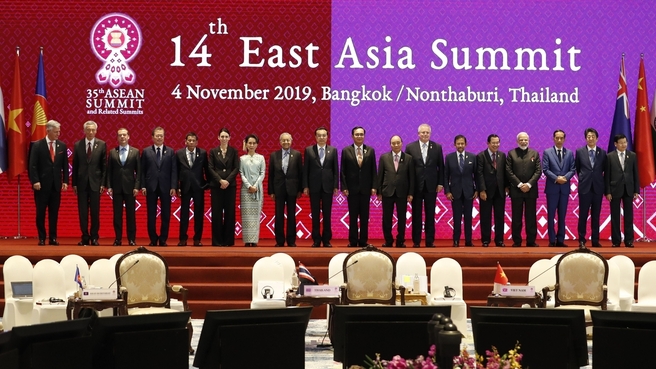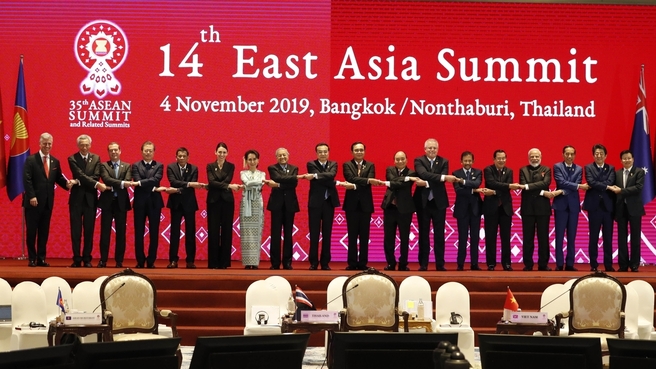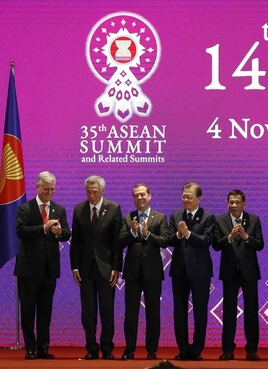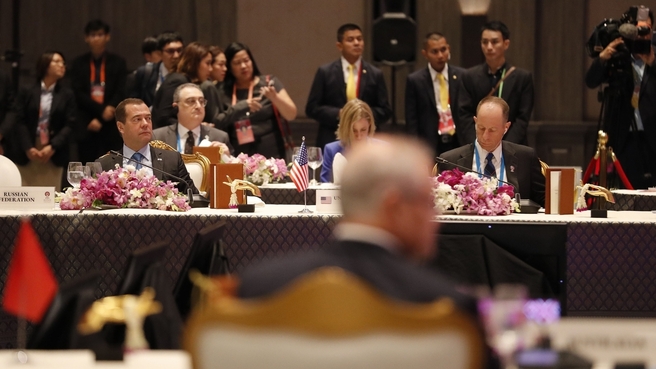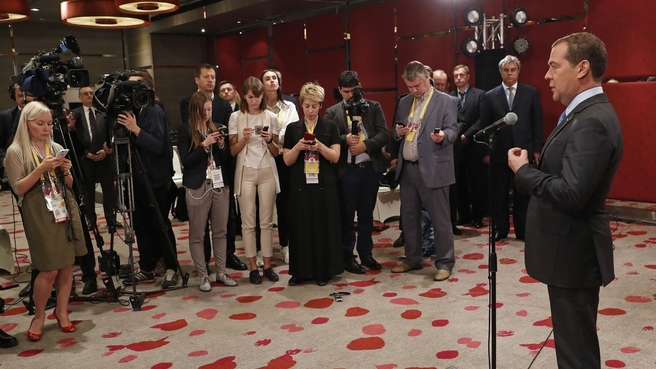Dmitry Medvedev attended the summit and gave a news conference for Russian journalists.
Dmitry Medvedev’s news conference for Russian journalists
Joint photo opportunity for heads of delegations taking part in the 14th East Asia Summit
The East Asia Summit was established in 2005 for strategic dialogue between the Asia-Pacific leaders on security and economic growth. Meetings in this format take place annually in conjunction with the top-level events of the Association of Southeast Asian Nations (ASEAN).
Eighteen states currently participate in the East Asia Summit: the 10 ASEAN countries and their dialogue partners (Australia, China, India, Japan, New Zealand, Russia, South Korea and the United States).
The mission statement of the 14th East Asia Summit is “Partnership for sustainable
development.” The summit agenda includes strategic planning for the
Asia-Pacific Region and advancing practical collaboration in such priority
areas as finance, energy, environmental protection, emergency response,
healthcare, education, regional interconnectedness, maritime cooperation and
food security.
Documents adopted during the summit:
– Statement on Combating the Spread of Illicit Drugs;
– Statement on Cooperation to Combat Transnational Crime;
– Statement on Partnership for Sustainability.
Dmitry Medvedev’s news conference for Russian journalists
Excerpts from the transcript:
Dmitry Medvedev: Hello everyone! I would like to wish a happy National Unity Day to those of you who are in Thailand and, of course, all our citizens.
Question: Mr Prime Minister, TASS agency.
For the past several days, you have been working at various international summits – first, the SCO meeting, now the East Asia Summit. Perhaps you could give us a summary of the outcome and highlight the most important decisions? Overall, in your opinion, how relevant is this format, and does it often bring about momentous decisions? Because we all witnessed how, due to a domestic conflict in Chile, the APEC Leaders’ Summit was cancelled – apparently, with no terrible consequences.
Dmitry Medvedev: Of course, cancelling a summit is not a global disaster. But if you are interested in my opinion, summits and meetings at the level of heads of state and government are beneficial because they allow us to solve a variety of issues through direct communication. These are issues that concern a large number of states – multilateral and bilateral issues.
You
mentioned two events which I attended. First there was the Heads of Government Council
Meeting of the Shanghai Cooperation Organisation in Tashkent. The SCO has existed
for quite a long time. It was established in 2001, and I remember those events
in Shanghai very well. Since then, the Organisation has made significant
progress and is now helping to resolve security and economic issues as well as
various humanitarian issues. We had an opportunity to exchange opinions on
further developing the Organisation itself. I had meetings with my colleagues
and partners, the President of Uzbekistan and Premier of the State Council of
the People’s Republic of China Li Keqiang.
I talked with all the leaders on the sidelines. It always helps to compare notes. Even you meet someone often, there is nothing like personal contact. This is also true of the East Asia Summit which is a continuation of ASEAN events. It has a special atmosphere since it is attended by leaders of the states of the East Asian community, the Asia Pacific Region – the Russian Federation is included in this too, obviously – and we discuss the most urgent issues.
Various subjects were discussed at the event, which just ended, including issues of economic cooperation, various economic problems, issues of energy, food, climate cooperation and responses to the serious challenges of climate change. And also different conflicts, which is also very important since a conflict usually affects several countries, and they normally communicate in a bilateral dialogue format, that is, bilateral communication, whereas here one can express a position in the presence of everyone, and it will be heard by the heads of state or government. This makes it possible to move the most complicated issues along in a civilised way. For example, a complicated issue (this does not concern our country, but it does concern many ASEAN members) like delimitation in the South China Sea.
An overall conclusion is like that: summits are not a panacea, they cannot instantly resolve big issues, but they are necessary since they allow for moving forward on the most diverse issues of political and economic cooperation, and collaboration in humanitarian and security issues.
Question: At the business summit yesterday you said that Russia is ready to provide its Southeast Asian partners, and others as well, with the latest solutions in the digital economy. What specific projects did you mean?
Dmitry Medvedev: We ourselves do not think we have achieved fantastic progress in promoting the digital agenda, but it is on our domestic agenda at present. But we do have some very good solutions in some areas, including in ensuring information security and cyber security. This is what I meant.
Question: Rossiya 1. Mr Medvedev, to follow up on the “digital” issue, yesterday you cautioned against monopolisation in the IT area. How much does this concern Russia because we also have several big companies, giants, so should we be worried about digital sovereignty?
Dmitry Medvedev: You see, our companies are not giants yet, they are fairly big for our market, but in comparison with Google, Apple or Huawei, they are on a different scale. This is the reason our market has not been so monopolised. It should be monitored – including in our country, obviously, but let’s be frank - I think it’s critical that our IT, internet communications, and modern media companies be big enough to be able to compete with other nations. If, hypothetically speaking, we had no Yandex or Mail.ru, we wouldn’t be able to offer browsing services that compete with the Google, if it had been split among 20 small companies. Meanwhile, our search engines are being used in Russian-speaking countries, the Russian world, in Russia, the CIS countries and other places. This is why these companies have to grow more.
Meanwhile, regarding global companies, it’s a different story. They are already so big that they can impose their opinion, they can potentially cut off traffic in a minute, put up restrictions, licences, block certain devices. This is what’s risky, so we need to agree on the rules. And in this sense we must ensure digital sovereignty for our country.
Question: Interfax. Mr Medvedev, Thailand hosted today’s and yesterday’s summits. Thailand is one of Russia’s biggest partners in the region. But when the subject of Thailand comes up we always think of tourism. Do you think this is still a stereotype? Are there other promising areas for Russia and Thailand to cooperate?
Dmitry Medvedev: Both statements are correct, of course. About 1.5 million Russian tourists came here last year, and there will probably be even more this year. If you exclude Chinese tourists, we are the second largest country that comes to these beaches to take a holiday in Thailand for understandable reasons because we are a northern country.
But our cooperation isn’t limited to that. Soon we will mark the 125th anniversary of diplomatic relations. Russia and Thailand have been cooperating since the time of the Tsars. Everyone knows the stories related to the steps in this cooperation, the milestones, and, by the way, our Thai friends generally appreciate that and always come back to it.
We discussed various areas of cooperation during the talks. We can list what’s already on the agenda and what will be on it shortly, for example, purchasing Russian equipment. Airplanes and helicopters are a large, important market and this is certainly very interesting to us. Also, cooperation in the digital area that we talked about, and a number of infrastructure projects that I think could result in some changes in the trade structure, the arrival of these areas in commerce. I think there are good conditions and opportunities for cooperation in agriculture because we can send meat here, and different types of meat at that, which is popular in Thailand. Our Thailand partners can supply us with Thai fruits which are well-known for high quality. But it is fruit that doesn’t grow in our country and we cannot substitute their imports.
There are also examples of very large investment. One of Thailand’s biggest companies has already invested around 1 billion dollars in milk production in our country. This is a large sum, and this company is set to invest more. We can only welcome that because we are all aware that milk production is a difficult business with a long investment cycle and not really high profitability.
Question: Formats like the SCO, ASEAN and the East Asia Summit that you attended today are made to ease borders, contribute to using a dialogue, an exchange of ideas, and in a practical sense – the exchange of goods and services. Yet we see something totally different in the world: trade wars are unfolding; policies of protectionism are being promoted with a trade standoff between the US and China and the EU. Do you think traditional organisations like the WTO, International Monetary Fund and multilateral cooperation structures in general are viable now, or should we turn more to bilateral cooperation? What if this format is more effective, where two countries make deals between themselves?
Dmitry Medvedev: I don’t think there is an alternative to multilateral cooperation, multilateral trade systems and the World Trade Organisation. There are many problems there, a lack of understanding. A number of nations have taken a tough stance on the WTO – I mean primarily the United States which has recently been rather successfully undermining the foundations of this organisation – and do not recognise the WTO judicial body and are set on changing the rules.
But whatever we might say, current commodity flows are subject to general common factors. The import/export of commodities follow common rules, and the international trade system must also be regulated on the basis of common rules. This system might be imperfect, but there is no alternative to this comprehensive, systematic regulation on a multilateral basis. Without this we will be thrown back into the 19th century. Of course, some issues can be resolved at the bilateral level. But what distance would we have to cover to deliver goods from one point to another, for instance, from Thailand to the Russian Federation? Obviously, this requires an international level of regulation. I am confident that we will ultimately arrive at the awareness of the value of such international organisations and restore their regulating significance.
Question: Radio Mayak. Mr Medvedev, we are marking the Day of National Unity overseas. The holiday which is supposed to unite peoples and people who stood up for their Fatherland shoulder to shoulder.
At the same time we hear odd statements, for example, President of Belarus Alexander Lukashenko said recently that Belarusians were constantly dragged into wars – first in the Patriotic war, then in another. Do you agree with that position?
Dmitry Medvedev: You know, I think we should never cast even the slightest shadow on the actions of our ancestors who defended their homeland. They lived in what is now Russia or Belarus, but it was their land they were defending. This was the case in 1812 and in World War I, no matter how the historians evaluate it, and it was the case in the Second World War, or the Great Patriotic War. Our fathers and grandfather were defending our land – it was not fighting in others’ wars. It’s a bit odd to hear things like that.
I believe it is especially important to stress this on a holiday like today’s. Today is National Unity Day. It is common knowledge that in 1612 Russia was saved from invaders, and it made it possible for it to remain united, strong and big. So allow me once again to recognise National Unity Day and wish you a happy trip home even if it does take 11 hours.
All the best, and good bye.
